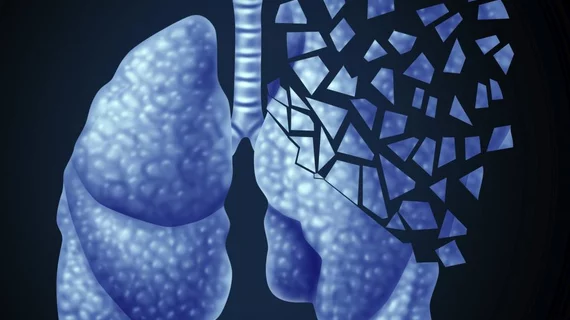New tool solves ‘urgent medical need’ to help patients with multiple pulmonary nodules
A new machine learning tool accurately predicts cancer risk in patients with multiple pulmonary nodules, potentially guiding providers’ decision-making prior to treatment.
That’s according to a new multicenter study out of China, which incorporated both nodule imaging features and sociodemographic variables into a cancer prediction tool. It performed well when validated on patients from multiple hospitals, beating out prior AI tools, mathematical models and human experts.
Given the now-widespread use of thoracic CT for lung cancer screening, the researchers believe their model can help keep up with the “urgent medical need” for managing patients with multiple pulmonary nodules.
“Our prediction model, which was exclusively established for patients with multiple nodules, can help not only mitigate unnecessary surgery but also facilitate the diagnosis and treatment of lung cancer,” Young Tae Kim, MD, PhD, a thoracic and cardiovascular surgery professor at Seoul National University Hospital in Korea, explained in a statement.
The team developed their model, known as PKU-M, using 1,739 nodules from 520 patients treated at a single Chinese hospital between January 2007 and December 2018. In a training group, it keyed in on nodule size, count, distribution and patient age to notch an area under the curve score of 0.91 for predicting cancer.
Kim et al. then validated their tool on 583 nodules from 220 patients who underwent surgery across six independent hospitals between January 2016 and December 2018. In this group, PKU-M achieved an AUC of 0.89 and beat out four lung cancer prediction models.
For their last test, the team prospectively compared their model to four providers, including one radiologist, and an AI-based lung cancer diagnosis tool. In a separate group of 78 patients treated at four hospitals, the machine learning tool reached an AUC of 0.87, beating out surgeons (AUC ranging from 0.73 to 0.79), the radiologist (0.75), and AI model (0.76).
The research team explained that models should be practical to help aid clinical diagnoses. So they developed a web version where doctors can input clinical and imaging characteristics and the tool will automatically determine a patient’s cancer risk.
“This tool can quickly generate an objective diagnosis and can aid in clinical decision-making,” Jun Wang, MD, a professor in the Department of Thoracic Surgery at Peking University People's Hospital in China, remarked.
Read more about the study published Wednesday in Clinical Cancer Research here.

